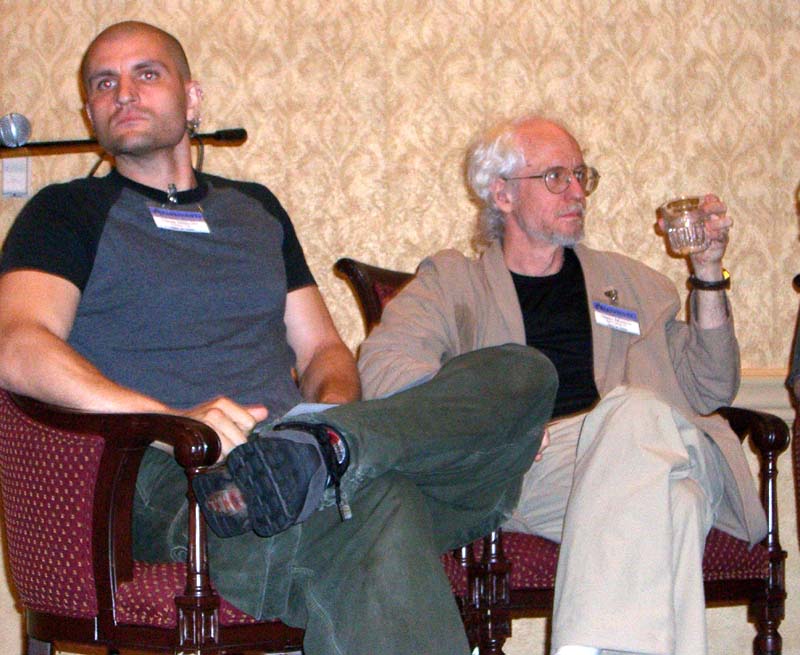CIMG3395 The War of Worldviews panel at Readercon 2006
CIMG3395 Guests of Honor, authors China Mieville and James Morrow at The War of Worldviews panel at Readercon 2006
The War of Worldviews was a panel that, looking at my notes, I assume was about a conflict between the scientific and religious worldviews. Some people pointed out that our lives are unimaginable without technology, so science seems to have won. “How can we sit in a room with cellphones, computers, etc., and say science doesn’t work, that it’s being destroyed by forces of irrationality?” But not many agreed with that conclusion. Instead, while listening to the panelists’ arguments, I noticed they were mentioning World War I a whole lot.
Some people here kept bringing up World War I as an event that proved that the rational worldview was not all powerful, as it failed to prevent killing of millions of people. And by “some people” I mean mostly China Mieville. According to him, Lovecraft and Tolkien recognized that something went incredibly wrong in the first half of the 20th century. The “something” eventually manifested as the two world wars. Another panelist clarified that it was Virginia Woolf who said that something went wrong with human nature around the year 19??. Perhaps he meant Virginia Woolf quote “On or about December 1910 human character changed” (the source is this New York Times article). Tolkien’s and Lovecraft’s works were two different responses to the disillusionment in human nature that WWI brought. To Lovecraft, the physical reality was “predicated on a monster that destroys them all”. And Tolkien, according to China Mieville, is like a “desperate mean rocking himself and saying “this will be OK”. Tolkien knew something world-shattering has just happened.” (I didn’t quite get his drift, despite having read most of Tolkien’s works. — E.)
Brett Cox agreed that World War I was a turning point, not only smashing our illusions about enlightenment, but also smashing our romantic vision of progress.
Another thing that kept coming up was “Campbellian worldview”. The panelists attacked it mercilessly. Campbellian in this case means a worldview espoused by the famous science fiction editor of the mid-20th century, John W. Campbell, who, according to Wikipedia, helped to shape modern science fiction more than any other individual. As far as what Campbellian worldview really is, I could only piece it together from the snippets of what other people said, not just at Readercon but at other conventions I’ve been to over the years. Campbell, as I heard, only published the kind of science fiction where the good guys and rationality triumphed. That’s probably an oversimplification, but it seemed that it was this kind of naive optimistic view — a belief that science and technology were always the forces for good — that the panelists attacked. Several of them mentioned that the Campbellian worldview did not represent actual rationalist view.
In light of World War I, they said, Campbelian science fiction was nothing more than a post-factum propaganda. “The Campbellians know they are bullshitters and that’s why they are so nervous,” said China Mieville. “To set Campbelian SF as a paradigm of a rational worldview is a misunderstanding,” said another panelist. “The assumption is the Campbellian SF championed rationality; on the other hand, it is hard to read some works of Robert Heinlein and see them as a pure statement of rationality,” said Brett Cox. Others reminded us that Campbell was fond of paranormal phenomena, which casts even more doubt on his presumed rationality.
Some panelists tried to steer the conversation away from attacking the low-hanging fruit, Campbellian SF as a stand-in for rational worldview as a whole. James Morrow said, “All the enlightenment is really saying, things were not optimally arranged from on high. Our institutions are not god-given. So let’s have a great big conversation about it.”
But overall the panel was quite chaotic and the conversation circled around and around without neither agreeing nor disagreeing on something.
Readercon 2006, Burlington, Massachussets, July 2006
